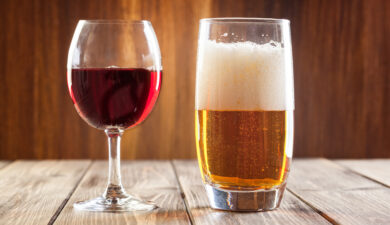
Three Brabant theaters may tax the alcoholic intermission drinks included with an entrance ticket at the low VAT rate of 9 percent, the court in Den Bosch rules. There is one performance, the court finds, which thus overrules an earlier judgment of the Breda court.
Since 2018, one of the theaters has charged an amount for tickets that includes the performance, use of the cloakroom and a drink during the break. However, administration costs of 90 cents per entrance ticket will be charged separately. When filing the sales tax return, an amount of 2.25 euros is charged per ticket for the intermission drink and all drinks are declared at the low rate. However, the tax authorities are imposing an additional assessment, also for the period in which the catering in the theater was still outsourced (before 2018): the provision of intermission drinks is not an additional service, but a stand-alone service, or so the argument goes.
Also read: Break drink and performance of independent services for VAT
One or more achievements?
In principle, 21 percent VAT applies, according to the court, but the reduced rate applies to granting access to the performances. If a taxpayer performs one or more actions towards one customer in which different performances can be distinguished, then each of those performances must be regarded as distinct and independent for the purpose of levying turnover tax, the judge further considers. And that is the case here: ‘First of all, the provision of the intermission drink is not so closely linked to access to the performance that, viewed objectively, it constitutes one indivisible performance, the division of which would be artificial.’
And even though a break drink makes a visit to the theater more pleasant, providing it does not make it optimal to visit the performances as such. ‘In the court’s opinion, obtaining an intermission drink from the perspective of an average visitor is a separate interest compared to access to the theater performance.’ In short: the tax authorities are right, the court finds.
Separate interest
The theater is appealing and the court is considering whether or not a reduced rate should apply to intermission drinks containing alcohol. The court ruled that, from the perspective of the average visitor to a performance, the intermission drink constitutes a separate interest compared to attending the performance. ‘In the present case, it is established that visitors can choose to visit the performance without having an intermission drink. For visitors who do not want to drink anything, the break drink is not important. For those who do take an intermission drink, this does not change the performance. Granting access to the performance can certainly be regarded as an independent performance. Before the introduction of the ‘wallet-free break’, this service was (after all) also offered as an independent service.’
Not a goal in itself
But the court has a different opinion about the phenomenon of additional performance: ‘For the average consumer, the break drink is not an end in itself. The intermission drink makes a visit to a performance more attractive and is a means to benefit from it as much as possible. The interested party offers a complete ‘package’ of a performance including intermission drinks and cloakroom costs, to save the customer the stress of waiting in lines and having to make separate payments during the visit.’ It is important that the Tax Authorities did not respond to the argument that the construction, among other things, removes time pressure to buy and consume a drink within the intermission of the performance of a maximum of 20 minutes. ‘The intermission drink can be regarded as an attractive snack or an attractive end to the theater visit, the consumption of which is only possible for visitors to a performance.’ According to the court, there is therefore a single performance, consisting of several elements, which must be taxed at the rate of the main element, even though it is possible to determine the amount of the compensation for each element.
Not excepted from reduced rate
The fact that the provision of alcohol is exempt from the reduced rate is not an issue, according to the court. There is no question of a hotel, café, restaurant, guest house or related company. ‘For the interested party, the service aspect of providing the break drink is hardly present. The drink will be prepared prior to the break. Most visitors grab a drink that is ready and the minority orders a drink at the bar. The bar is only open before, during and after performances and, unlike a café or restaurant or related business, has no independent meaning. Only visitors to a performance (and not outsiders) can use the bar.’
In the two other cases the court came to the same conclusion; one of the theaters therefore does not have to pay 15,000 euros in additional taxes.
Den Bosch Court of Appeal, September 27, 2023
